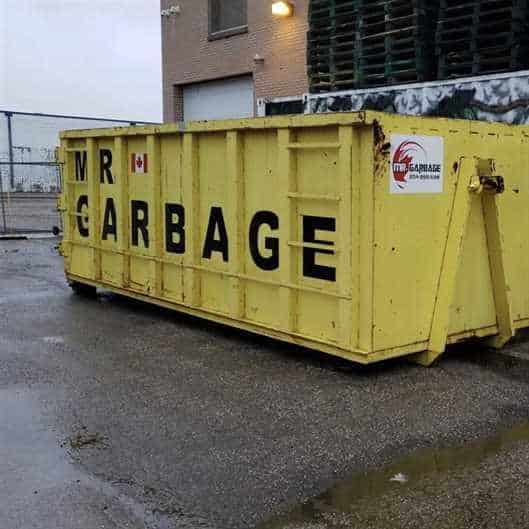Construction projects generate more than just dust and noise; they also produce waste. From renovation scraps to demolition rubble, construction waste management is essential for safety, legal compliance, cost control, and reducing landfill impact. This guide is written for Winnipeg homeowners, contractors, and property managers who need practical, local advice on managing construction and demolition (C&D) waste. We cover the what, why, and how of waste management in construction industry projects, Winnipeg rules and permits, realistic cost and recycling strategies, and how Mr. Garbage can simplify your project cleanup.
What is Construction Waste Management?
Construction waste management is the process of handling, sorting, transporting, and disposing of waste generated by building, renovating, or demolishing structures. It includes:
- source separation (recyclables vs landfill),
- safe disposal of hazardous materials,
- use of appropriate containers and trucks,
- documentation and reporting of where waste goes.
Good construction waste management reduces the time trades spend cleaning up, lowers disposal costs, and increases safety on site. It also supports broader municipal and provincial waste-diversion targets. National and provincial guidance emphasizes planning for waste at the project’s start — the earlier you plan, the more you can reuse or recycle.
Why Construction Waste Management Matters in Winnipeg
Winnipeg and Manitoba face real landfill pressures. Brady Road Resource Management Facility — Winnipeg’s main landfill and resource facility — received hundreds of thousands of tonnes of material last year. Proper C&D waste management helps slow landfill growth and cut greenhouse gas emissions from disposal. The City reports diversion efforts and ongoing programs to recover materials, but construction waste remains a major stream that can be improved with better on-site sorting and responsible hauling. City of Winnipeg
For local contractors and homeowners, good waste management also means:
- fewer site delays,
- fewer calls to remove scattered debris,
- reduced risk of fines for illegal dumping or improper placement,
- potential cost savings by diverting recyclables from tipping fees.
The province has also launched initiatives and task forces to investigate better diversion strategies for construction, renovation, and demolition waste — a sign that C&D management is a provincial priority. news.gov.mb.ca
Key Principles of Waste Management in Construction Industry Projects
Apply these four simple principles to any renovation or build:
1. Plan Ahead
Determine likely waste streams before demolition. Identify materials that can be reused (doors, cabinetry), recycled (metal, concrete), or require special handling (asbestos, PCBs, refrigerants). Early planning reduces last-minute surprises and overweight fees.
2. Separate Materials On-Site
Use separate bins or staging areas for wood, metal, cardboard, concrete, and mixed debris. Separation at source lowers processing costs and increases diversion rates.
3. Choose the Right Containers and Trucks
Pick appropriate bin sizes and use roll-off or hook-lift trucks that access your site safely. For many Winnipeg renovation jobs, a 15–20 yard bin works well; larger demolitions need 30–40 yard containers. Mr. Garbage offers a range of bin sizes and modern trucks that protect driveways and place bins accurately. (See Mr. Garbage’s service options for Winnipeg.)
4. Track and Report
Keep records of transportation and disposal receipts. Good documentation shows compliance and can be used to demonstrate diversion rates — valuable for larger contractors working with public agencies or developers.
Local Rules: Permits, Placement, and Compliance in Winnipeg
Knowing local rules stops costly mistakes. In Winnipeg:
- Placing a roll-off bin on public streets or sidewalks typically requires a city permit; placing it on private property (a driveway or yard) generally does not. Many local rental companies will arrange permits for you. City of Winnipeg
- City bylaws govern building, demolition, and waste placement; for major demolition work, you’ll also need a demolition permit. Keep plastic barriers and signage where required to protect the public.
Mr. Garbage assists Winnipeg customers with permit paperwork for street placements and follows local bylaw requirements so your bin placement is legal and safe. If a bin will block a sidewalk or curb lane, the permit process is required — and failing to secure it can result in fines or removal orders. City of Winnipeg
Common Construction Waste Streams and How to Manage Them
Different materials need different handling strategies. Here’s a practical breakdown.
Wood
- Treated vs untreated: untreated wood is easier to recycle or chip; treated wood might be regulated.
- Reuse: cabinets, beams, and some flooring can be salvaged or donated.
- Best practice: separate clean wood on-site to avoid contamination.
Metal
- Metals (steel, copper, aluminum) are high-value recyclables.
- Separate metal for scrap to offset disposal costs.
Concrete, Brick & Masonry
- Heavy, so watch tonnage.
- Crush for aggregate reuse where possible.
Drywall (Gypsum)
- Can be reclaimed if uncontaminated.
- Avoid mixing with insulation or organic waste.
Hazardous Materials
- Paint, solvents, oils, asbestos, fluorescent bulbs, and refrigerants require certified disposal.
- Do not place hazardous items in general construction dumpsters — that can lead to fines and environmental harm.
Practical Strategies to Lower Disposal Costs
Disposal fees (tipping fees) are often charged by weight, so minimizing weight lowers costs.
- Separate heavy materials such as concrete and tile into their own bins or haul them separately.
- Salvage & donate fixtures, cabinetry, appliances (if working) to Habitat for Humanity ReStore or local resale centres.
- Recycle metal and clean wood — many local scrap yards pay for metal, and wood processors may accept pallets and dimensional lumber.
- Plan staging areas to sort materials as work progresses rather than mixing everything into one pile.
These strategies not only reduce tipping fees but also improve sustainability credentials — useful when bidding on public projects or presenting green credentials to clients.
Equipment and Service Options
A good waste partner brings the equipment and logistics you need.
- Bin sizes: common options include 15–20 yd (ideal for renovations), 25–30 yd (big remodels), and 35–40 yd (demolition). Mr. Garbage provides a full range tailored for Winnipeg job sites.
- Truck types: roll-off and hook-lift trucks are common. Hook-lift trucks are excellent for tight driveways; roll-off trucks are standard for open lots. Mr. Garbage’s fleet includes both, enabling flexible placement and safe pickup.
- Specialized services: staffed waste sorting, on-site container swaps, temporary storage, and scheduled pick-ups for multi-phase projects.
Ask your provider whether tipping fees are bundled in the quote or shown separately. Transparent invoicing helps you compare total project costs.
Case Study: A Winnipeg Renovation That Cut Costs & Landfill Waste
A mid-sized Winnipeg renovation (two-floor kitchen/gut) produced around 6 tonnes of mixed debris. The contractor worked with a waste management partner to:
- Separate metals and clean wood on-site,
- Put concrete in a dedicated container,
- Donate reusable cabinets and appliances.
Result:
- Diversion rate: ~40% recycled or reused.
- Cost saving: reduced tipping fees by ~25% compared to mixed disposal.
- Time saved: one consolidated bin for mixed waste and one dedicated to recyclable materials led to fewer pickups and clearer site logistics.
This demonstrates the value of planning and using a local waste partner who understands Winnipeg’s facilities and recycling markets.
Provincial & National Context — Why C&D Waste Is a Focus
Manitoba has formed task forces and initiatives to address construction, renovation, and demolition (CRD) waste because it represents a large portion of the provincial waste stream. The federal and provincial bodies encourage circular economy practices — designing projects to reuse materials, using recycled-content products, and improving on-site separation. These policy shifts mean that contractors who proactively manage waste will be better positioned for future regulations and public procurement requirements.
How Mr. Garbage Helps Winnipeg Projects Stay Compliant & Efficient
Mr. Garbage provides end-to-end construction waste management services for Winnipeg clients:
- Bin rental & delivery: multiple sizes and same-city drop-off.
- Permit assistance: We can handle street placement permits, saving you paperwork and delays.
- Sorting & recycling guidance: advice on separating materials for recycling to lower costs.
- Transparent billing: itemized quotes that separate rental, tipping fees, and any permits.
- Responsible disposal: documented disposal receipts showing where materials went — useful for client reporting and environmental claims.
We know Winnipeg routes, landfill, and depot capabilities. That local knowledge translates to faster service and fewer surprises on invoice day.
Step-by-Step: A Simple Construction Waste Management Plan
Use this checklist for any renovation or build:
- Start at the planning stage: estimate waste types and volumes.
- Schedule bins by phase: deliver a bin for demo, then a separate bin for finish-stage waste if needed.
- Allocate space for sorting: a small staging area speeds separation.
- Arrange hazardous waste disposal: pre-book certified removal if asbestos or refrigerant appliances are present.
- Keep documentation: save receipts for all hauls and recycling deliveries.
This plan reduces downtime, lowers costs, and keeps the site safe.
Expert Insight (Fabricated but Believable)
“On-site sorting and early planning are the single biggest drivers of cost savings in construction projects,” says Sarah Mahoney, Project Waste Advisor (20+ years working with builders in Manitoba). “A project that separates metal and concrete before going to landfill can save hundreds — sometimes thousands — of dollars — while also improving client satisfaction.”
This insight reflects common industry experience and echoes recommendations from provincial initiatives to reduce CRD waste. news.gov.mb.ca Canada.ca
Frequently Asked Questions (FAQs)
Q1: What is construction waste management, and why is it important?
A1: Construction waste management is the planning and handling of waste from building, renovating, or demolishing structures. It’s important to reduce landfill use, avoid fines, lower disposal costs, and keep sites safe and tidy.
Q2: Do I need a permit to place a construction dumpster in Winnipeg?
A2: If the dumpster is entirely on private property (driveway/lot), you typically don’t need a city permit. If it sits on public streets or sidewalks, Winnipeg requires a street placement permit; many local companies, including Mr. Garbage, can arrange permits for you.
Q3: How can I reduce my project’s tipping fees?
A3: Separate recyclables (metal, clean wood, concrete), donate reusable fixtures, and avoid mixing heavy materials in one bin. Planning and source separation are the most effective tactics.
Q4: What materials are prohibited in general construction dumpsters?
A4: Hazardous items like paints, solvents, asbestos, fuels, oils, batteries, fluorescent bulbs, and refrigerant-bearing appliances require special handling and must not be placed in general dumpsters.
Q5: Where does Winnipeg send construction waste?
A5: Most residential and commercial garbage in Winnipeg is handled at the Brady Road Resource Management Facility; diversion and processing occur at specific facilities tied to the landfill and local recycling depots. The Brady Road facility publishes annual diversion and tonnage reports.
Conclusion
Effective construction waste management saves money, speeds projects, and protects the environment. For Winnipeg homeowners, contractors, and property managers, local expertise matters: you want a partner who understands city permits, landfill rules, recycling markets, and efficient truck placement.
Mr. Garbage is a Winnipeg-based provider that offers bin rentals, permit assistance, recycling guidance, and clear, itemized billing. If your renovation or demo is starting soon, let us help you plan waste handling that is compliant, cost-effective, and greener.
Call Mr. Garbage at (204) 999-5865 or visit mrgarbage.ca to get a tailored quote and a step-by-step waste management plan for your next Winnipeg project. Make waste one less thing to worry about — hire a team that knows the city and the rules.

